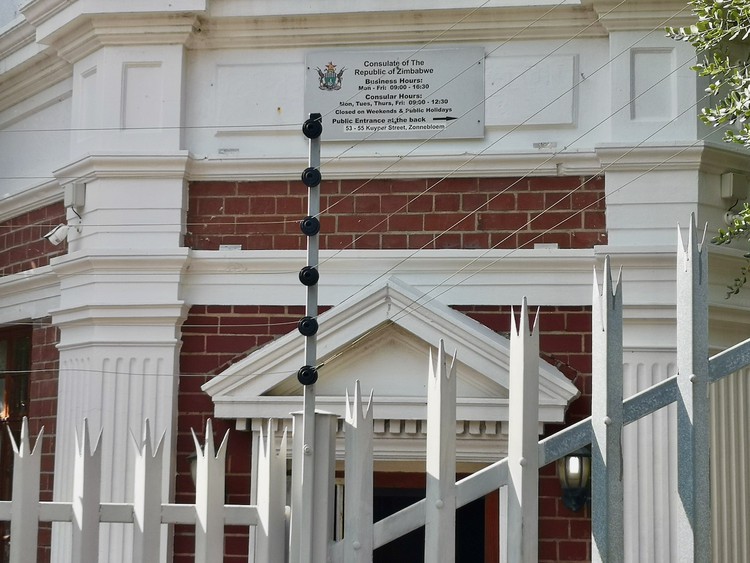Covid-19 pandemic leaves immigrants desperate for assistance
Thousands ask for food parcels
Zimbabwe Ambassador David Hamadziripi says over 4,000 Zimbabweans have approached the embassy requesting food. Photo of the Zimbabwe Consulate in Cape Town: Tariro Washinyira
“There is nowhere to run to … Life in my country is worse. People in my country are suffering more than us here who are in lockdown,” a Cameroonian asylum seeker in Cape Town told GroundUp.
She was referring to repatriation for Cameroonians stuck in South Africa (due to the Covid-19 pandemic), organised by the High Commission of the Republic of Cameroon.
She is one of many who have lost their livelihoods because of the lockdown. Her salon in Parow, which employed two other immigrants, has been closed since March. She has had no income, is in debt and struggling to pay the rent. Her husband’s car business has also closed down.
Her rent is R9,000 for the salon and R5,000 for her bachelor flat. “I sacrificed the last cent I had and asked friends for a loan to top up the rent. I have since run out of food. I am without hope. I do not know which lockdown stage I am allowed to resume work,” she said.
The rental agency offered her a Covid-19 relief agreement, but she said sections on legal fees and interest fees had been left blank, and so she refused to sign the document.
Many immigrants earn an income through informal trading, menial jobs such as domestic service, and casual jobs in the restaurant industry. They are without work and without government assistance.
Victor Chikalogwe of PASSOP said the organisation has been getting over 30 calls and more than 50 e-mails per day from different nationalities asking for food assistance.
“We received a grant to support Lesbian, Gay, Bisexual and Transgender (LGBT) with food but we had no choice, but to extend to all migrants as the need for food has been growing,” he said.
Via WhatsApp on 21 May, Bongani Mazwi Mkwananzi of ZimCommunitySA said that about 2,000 people had requested food parcels. They have managed to help 120 families. “Because of the delay of their payment of Unemployment Insurance Fund (UIF) and others being in an informal trade they are unable to pay rent and buy food. We hope the economy will open soon so that people would be able to go back to work.”
According to Zimbabwe Ambassador David Hamadziripi, the Zimbabwean Embassy had over 4,000 nationals approach them requesting food.
“Due to logistical and other capacity limitations, the Embassy has not undertaken a programme to distribute food packages. Rather, the Embassy has sent those lists to its partners, namely some organizations that have been established by fellow Zimbabweans as well as relevant agencies of the United Nations in Pretoria,” he said.
In a statement on 13 May, the Embassy announced that through a partnership with the founder of Bigtime Strategic Group, Justice Maphosa, free transport home would be available for Zimbabweans stuck in South Africa.
“The pre-embarkation checks will be done before every trip. It should also be noted that upon crossing into Zimbabwe, all returnees are subjected to mandatory quarantine at designated centres,” the notice stated.
Hamadziripi said that some Zimbabweans have changed their mind while others keep joining the list. “The figure is therefore fluctuating around 2,500 of which about a 1,200 have already left on either the self-funded or the assisted repatriation programme.”
He said the assisted repartition programme was fully funded. “All they have to do is to avail themselves to board the buses … Those who wish to be assisted must register with the Embassy or the Consulates through an online link or via email to [email protected], [email protected]
The new social relief of distress grants introduced by the South African government are only available to South African citizens or permanent residents.
Support independent journalism
Donate using Payfast

Don't miss out on the latest news
We respect your privacy, and promise we won't spam you.
Next: Workers whose employers did not register them for UIF can now apply for funding
Previous: Covid-19: Informal traders quietly defy ban on door-to-door selling
© 2020 GroundUp.
This article is licensed under a Creative Commons Attribution-NoDerivatives 4.0 International License.
You may republish this article, so long as you credit the authors and GroundUp, and do not change the text. Please include a link back to the original article.

